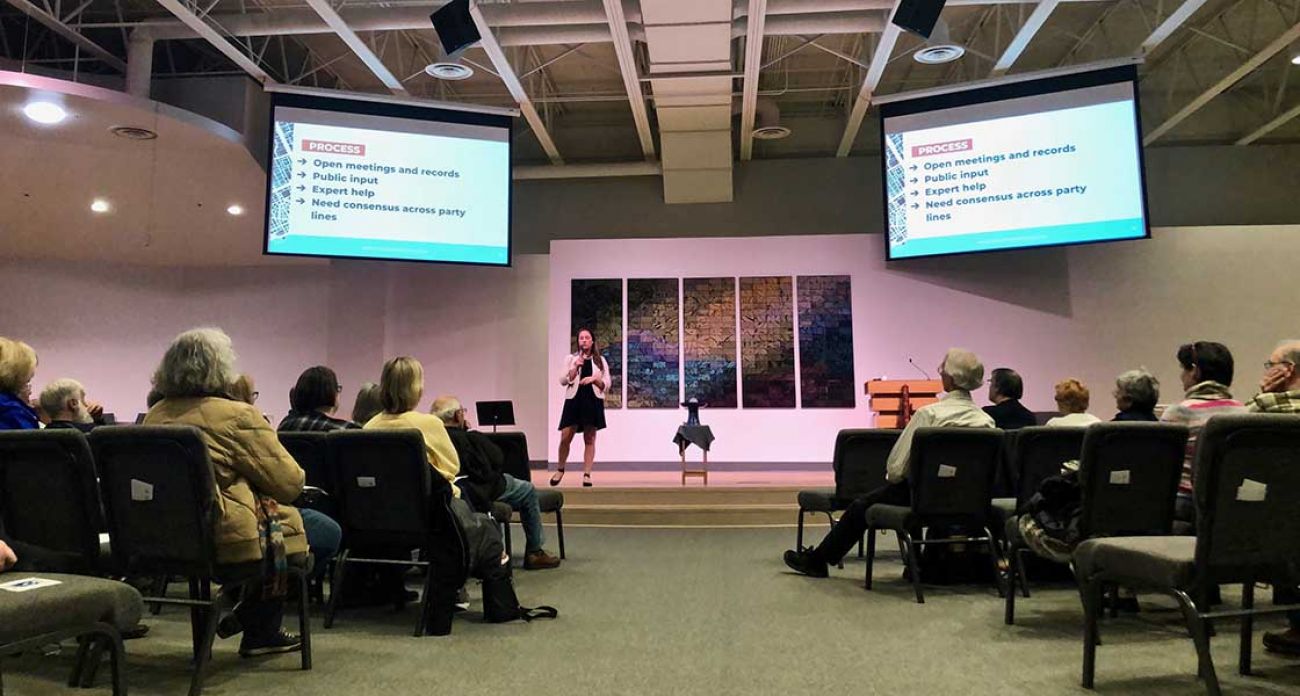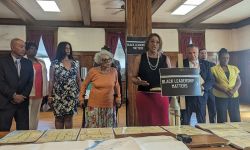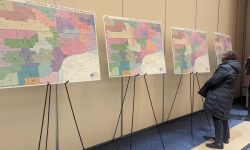Will this application help Michigan select a fair redistricting commission?

Secretary of State Jocelyn Benson unveiled for public comment a proposed application for Michigan residents who want to seek to position on a new citizens redistricting commission.
Thursday’s announcement is the first step in a three-year process that will see the commission assume responsibility for redrawing state legislative and congressional boundaries. The new body will replace the current method for drawing political lines, which in Michigan has allowed the political party in control of Lansing to shape district boundaries, leading to endless complaints of partisan gerrymandering.
Related: Michigan GOP files new suit to stop independent redistricting commission
August 2019: Voters Not Politicians asks to intervene in Michigan GOP redistricting suit
The commission, which is still taking shape, was created by the passage last November of a ballot initiative amending the state constitution.
The inaugural redistricting commission process will include three phases, Benson said:
- Shaping and publicizing the application to serve on the commission
- Selecting commissioners
- Commissioners, with public input, drawing new voting district lines
“Today we’re at the first step of that first phase,” Benson said. “We see citizen engagement as part of this process from the start of phase one to the end of phase three.”
The redistricting commission will consist of 13 members: four Republicans, four Democrats and five that aren’t affiliated with either party. Their terms would expire after their duties during the next census cycle are complete.
The application released Thursday has five pages of questions, including a requirement that applicants disclose their party affiliation and certain demographic information such as gender and race.
Most of it is intended to determine whether an applicant fits the criteria for serving on the commission, as outlined by the constitutional amendment. For example, officers in political parties and people who have recently ran for partisan elected office are among those who are ineligible.
It also includes information that may help potential applicants determine whether they’d truly like to serve on the commission if chosen, including salary ($44,000) and time commitment estimates (there will be periods of part-time and full-time work).
It notes that if applicants makes it to the final pool of 200, their application would be published online in full, omitting only their address, email and phone number.
An optional essay portion allows applicants to describe why and how they affiliate with the political party they’ve chosen and why they want to serve on the commission, though these questions cannot be used in the final determination of who serves on the commission. Rather, Benson said, they’d be used to inform legislative leaders (who each have five “vetoes” of applicants) and allow the public to vet applicants.
Applications must be notarized. Benson acknowledged this may be a barrier to some completing the application, but said the constitutional amendment requires applicants disclose their party identification under oath and that her office intends to do everything it can to ensure as many people as possible can turn in a completed form.
Benson’s office may even host forums where people can come get their applications notarized, or provide notarization at branch offices.
Voters Not Politicians, the group that brought the question of a redistricting commission to the 2018 ballot, lauded Benson’s approach to the process so far.
“Voters overwhelmingly supported a transparent, citizen-centered redistricting process and we are happy to see the Secretary of State’s office is executing its administrative role in that spirit,” said the group’s Executive Director Nancy Wang. “This is an exciting opportunity to engage in our democracy and restore the people’s trust in our government.”
The process of developing and vetting the application, as well as other processes necessary to set up redistricting commission (such as the requirement to send out thousands of applications to random registered voters), is currently being paid for by existing Secretary of State resources, Benson said.
“There’s been no allocation” from the Republican-controlled Legislature for additional funding to cover the costs of getting the redistricting commission up and running. “It’s been one of my deepest frustrations with this,” Benson said of proposed GOP budget cuts to her department. “The success of this process may very well hinge on whether the legislature funds it at every stage.”
The number of people who apply and have input on the process will depend on how much funding the Secretary of State has to implement public engagement programs. “My hope and my expectation is that the legislature will ultimately see that,” Benson said.
Public comment on the application will be accepted until Friday, Aug. 9. The final wording of the application will be publicly available this fall. In addition to being posted online, at least 10,000 copies of the form will be mailed to random registered voters throughout the state before the start of 2020.
Submission of applications will close in June 2020, and then the Secretary of State’s office will contract with an outside firm to draw 200 applicants from the pool, which must be representative of the geographic and demographic diversity of the state.
Of those 200, legislative leaders (including Senate Majority Leader Mike Shirkey, Senate Minority Leader Jim Ananich, Speaker of the House Lee Chatfield and House Minority Leader Christine Greig) will each be allowed to strike five applicants from the pool. The 13 commissioners will be randomly selected from the final pool of 180.
Learn more about how the redistricting commission would work once it’s seated here.
See what new members are saying about why they donated to Bridge Michigan:
- “In order for this information to be accurate and unbiased it must be underwritten by its readers, not by special interests.” - Larry S.
- “Not many other media sources report on the topics Bridge does.” - Susan B.
- “Your journalism is outstanding and rare these days.” - Mark S.
If you want to ensure the future of nonpartisan, nonprofit Michigan journalism, please become a member today. You, too, will be asked why you donated and maybe we'll feature your quote next time!




